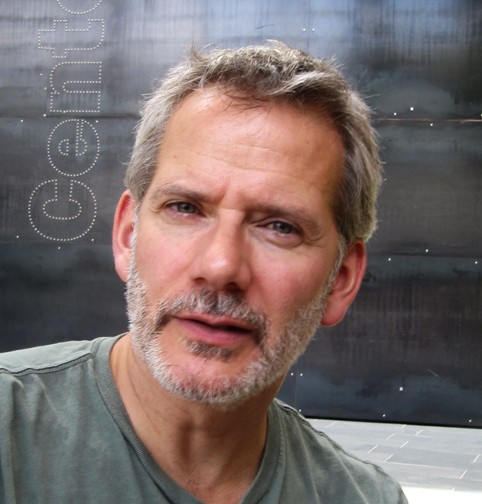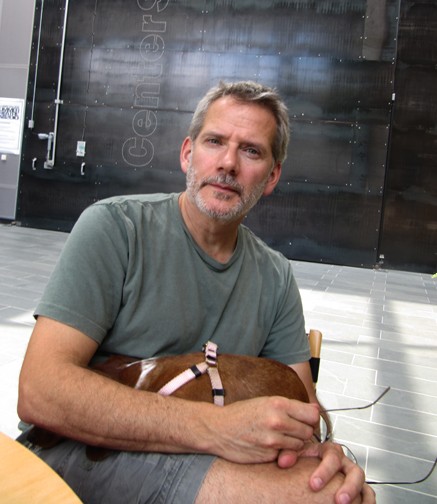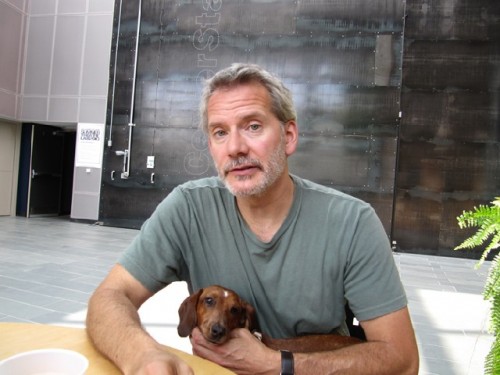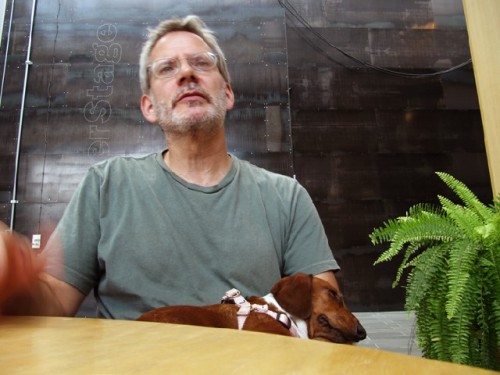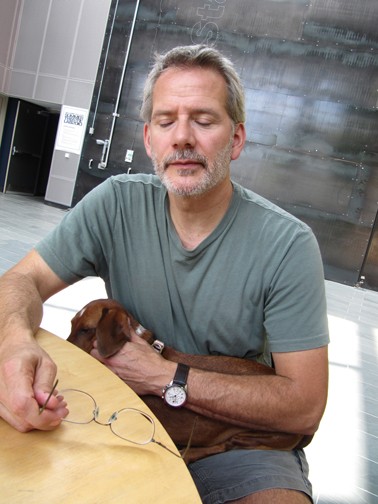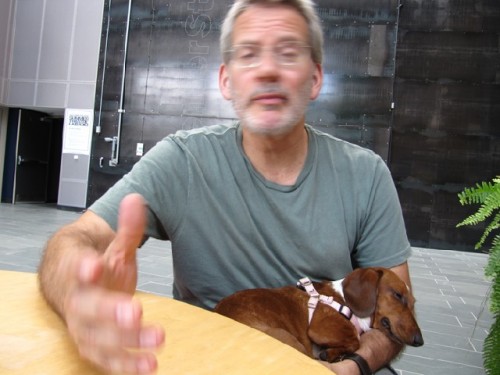Campbell Scott the Stage Manager of WTF’s Our Town
Actor, Director, Writer Returns to Damages This Season
By: Charles Giuliano - Aug 06, 2010
When actors and directors are in rehearsal there is limited access for interviews. Now that Our Town by Thornton Wilder has opened at Williamstown Theatre Festival Campbell Scott had time to meet with me. Promptly at 1 PM he arrived in “my office” a lounge of the 62 Center of Williams College. He was carrying a dachshund Spooky under his arm.
Campbell suggested we go outside on a beautiful summer day. But I was set up with my netbook. So he left for a few minutes to walk the dog. Then returned and settled down for what proved to be an intense, challenging, and insightful two hour conversation.
What follows is a long transcript of that dialogue. It ended at some point. I stopped taking notes, but we continued as a conversation. He seemed engaged and interested in the topics we touched on. It was a remarkable experience.
Part of the sense of leisure came from the fact that he conveyed being lonely. After a few weeks in Williamstown his wife, the actress Kathleen McElfresh, had to leave early for a job. She took their other dog.
The affection that he showed to Spooky, constantly stroking the pet nestled in his lap, reminded me of a scene in Secret Lives of Dentists when he was holding his child. It was a very different view of him than I had gotten two seasons ago when at WTF he played a sociopathic bastard in the riveting one man play The Atheist. That daunting character had lingered with me. In a sense it is what I thought he might be like. Of course the Stage Manager is very different. I learned that it is wrong to assume that the character you see on stage or screen is that person in real life. Of course the character is a reflection of some aspect of the persona. It is always fascinating to learn where and how an actor finds those roles.
Perhaps that’s a part of why actors are so intriguing to us. Because they get to portray and be individuals that they are not in their every day life. Campbell proved to be not The Atheist, The Stage Manager or the Spanish Prisoner. He was all of them and none of them. What I encountered was a particularly warm, generous and passionate guy who makes a living as an actor.
Campbell Scott (Born July 19, 1961)
Williamstown Theatre Festival
August 4, 2010
5th WTF Season: Our Town, The Atheist, Design for Living. Dead End, Miss Julie (also adaptor and director). Broadway: Long Day’s Journey into Night, Ah, Wilderness, Hay Forever, The Real Thing. Off Broadway: The Atheist, On the Bum, Measure for Measure, A Man for All Seasons, Pericles. Regional: (Partial List) Hamlet, Othello, The School for Wives, Our Town. Film: (Partial list) Longtime Companion, Dying Young, Singles, Roger Dodger, Spanish Prisoner, Beware the Gonzo, Duma, the Dying Gaul, The Secret Lives of Dentists, Off the Map, Big Night (Co directed with Stanley Tucci). TV: Six Degrees, Royal Pain, Damages (upcoming season).
Charles Giuliano What’s the dog’s name. I hear that they won’t give you campus housing with pets.
Campbell Scott Spooky. We have two dogs. That’s just the summer. That’s what theatre is about. We come with our family for five weeks. You just make it work like doing interviews with your dog. Because we get housed on campus the college has rules about no pets. But we always rent our own house anyway.
CG I don’t know where to bring this up but you have done a film called Beware the Gonzo. Just thought you might be interested to know that I coined the word. But credit was stolen by Bill Cardozo who famously wrote a letter to Hunter Thompson naming him as a gonzo journalist. Now that Bill and Hunter are deceased I am the only surviving first generation gonzo journalist.
CS Beware the Gonzo (2010) is an Indie I did at Tribeca starring this young kid who acted with me on Royal Pains.
(Eddie "Gonzo" Gilman (Ezra Miller) wants to write the truth in the school newspaper. But when he is thrown off the staff by his editor—and arch-nemesis—Gavin Riley (Jesse McCartney), Gonzo vows revenge. He starts an underground paper, "The Gonzo Files," to give a voice to the misfits victimized by Gavin Riley and his cronies. Gonzo assembles a crack staff, including the deceptively shy Ming Na, perpetually bullied Schneeman, Horny Rob (who hits on the less attractive girls for action), and the mysterious Evie. "The Gonzo Files" becomes a runaway hit and turns the whole school upside down, but the more successful Gonzo becomes, the more he learns that with truth comes consequences.)
CG In an interview with Dylan Baker he related that Nicholas Martin talked with him about doing Our Town last summer. He said that doing the play would depend upon casting Campbell Scott as the Stage Manager. That you were the essential glue needed to hold together what he considers to be the Great American Play. When did you become involved with the production?
CS Nicky had a few people in mind actually. The first was Michael Ritchie who seemed appropriate and cool for the part. Michael actually thought about it. He was here in Williamstown as artistic director a while back. But now he is busy as the artistic director of LA’s Mark Taper Forum. So I feel that I was the next person he couldn’t do without and happy to be so. So that’s when he called me. I can only do plays in the summer. I did not think of myself as a stage manager type because I associate the role with old and wise people and that’s not the way I feel.
CG What attracted you about the role?
CS I knew and had done the play. And I think that Nicky knew that. Years ago I was George in a production of Our Town at Seattle Rep. Our Stage Manager was an actor Biff MacGuire and he was fantastic. Biff was about 70 then, maybe younger, and is probably still around. (Biff McGuire (b. 25 October 1926, New Haven. His real name is William J. McGuire, and in recent years he has often used William Biff McGuire as his stage name.) He was wonderful. I couldn’t get him out of my brain. His Stage Manager is impossible to improve upon but if you take the job you have to make it your own.
CG What do you think Nicky (Martin) had in mind in wanting to stage Our Town for WTF?
CS He’s working with his friends. It’s important for him to assemble his own Our Town. It reflects what he was trying to do in this town. It’s important to him that the community here is a theatre community. This is his town. He was an actor for many years before becoming a director.
CG An actor?
CS He was an actor at Old Globe (San Diego?) in Hamlet back in 1990. That’s when we met as I was also in the production. We have been friends ever since. That was 20 years ago.
CG There have been mixed reviews for Our Town. Because it is such a familiar and often performed play a lot of the critics made comparisons to other productions. The Stage Manager in particular is an iconic role. The critics seemed to have their own ideas of how they saw the character. So they varied in responses to your laid back, conversational approach.
CS I talk to people every night. Between the acts I am there helping the stage hands to set up. Last night I spoke to a guy and as we talked to the gentleman he said “Now are you staying true to the script or embellishing it?” There is not a word I’m saying that Thornton Wilder didn’t write. The Stage Manager is classically performed and as such is not tied to the period of the play but is our license to interpret.
CG Martin states in the program that Our Town is the Great American Play. During intermission we debated this with some of the other critics. One suggested Death of a Salesman as the greatest play. I mentioned Who’s Afraid of Virginia Wolf. You have appeared on Broadway in O’Neill’s Long Days Journey Into Night as well as Ah Wilderness. Do you agree with Martin or do you have other ideas on The Great American Play.
CS Our Town is certainly one of the great American plays because of what it’s all about. There is the courage in the face of it not to disdain the utter rejection for an artist. When Wilder was doing this with a bare stage, actors using pantomime, dead people that talk, all that stuff. All those things we all use now but back then it was completely different and shocking. The critics hated it. People didn’t like it at first. Audiences didn’t know why they liked it but they did and they freaked out. It’s impossible to close the gap between your reactions as a critic. Everyone is a critic. And the gap between your real reaction between the critical experience and real experience of the play. It is always different. The play Our Town, when it is presented simple and straight, it transfers pretty quickly to everyone’s experience. We have been to see the Degas and Picasso exhibition at the Clark. People from all kinds of walks of life are checking it out. You can stand in front of a painting. While you are looking at the work somebody walks by with hardly a glance and another person spends ten minutes. To me Our Town is the definition of something worth looking at again. Death of a Salesman would be another. You can see a bad production of Virginia Wolf. Or you can see a production in which you say holy shit this is completely relevant.
CG Have you ever been to that kind of dinner party? I have. Sometimes its fun to play Get the Guests. Other times the guests get you.
CS I identify with the guests like what the hell is going on?
CG How do you see the Stage Manager. What did you do that’s unique?
CS What did I bring to the Stage Manager that’s unique? I don’t know. It’s an interesting role because you are not in the play. You are the guide. You don’t want to take attention away from the actors. But you have to take a place on the stage and set the tone for the evening. It’s bit of a balancing act especially the quick way we do things at Williams. I tell friends not to come to the play until the end of the two weeks. By then I am just beginning to figure it out. It’s all about some kind of an experiment. Some nights I feel connected and other nights I don’t.
CG You say that you can only do theatre in the summer. The Atheist started at the Huntington, then came to Williamstown before moving to New York that fall. It seems you got several months out of the play.
CS Off Broadway I did The Atheist every other week. It was the only way I could do it as a single parent. I have my son every other week. The way I kind of did theatre was when he was out of school every other week. I did it for a little while. I didn’t get that one (Atheist) right for me until the end. It was me talking every night for 90 minutes.
CG The Atheist was the first time you showed up on my radar screen. I found it riveting. The character really got to me. It was hard to recover from. It lingered. Particularly I identified with the fact that he was a journalist.
CS And a sociopath. He says the most amazing things that I would never say but are appropriate for the character.
CG During a recent conversation a friend mentioned that your parents were the actors George C. Scott (October 18, 1927 – September 22, 1999) and Coleen Dewhurst (June 3, 1924 — August 22, 1991). Do you mind talking about that? How did growing up in a theatrical family influence your becoming an actor?
CS Coming from a theatrical family I never wanted to be in the theatre. I went to school to be teacher.
CG What did you want to teach?
CS I majored in history at a small college in Wisconsin, Lawrence University in Appleton. I was staying away from theatre and had no inclination for it. In college I did a play and thought it was fun. But it was not my personality to be on the stage. I was influenced by a teacher in a small theatre department. You know how during your lifetime you have a few great teachers and mentors. My parents were smart about it and both were inwardly glad. When my brother (Alexander) and I both showed interest they encouraged us in a distant way but they didn’t want it for us.
CG Were they concerned about the challenges and disappointments of a rough life in theater.
CS There is no doubt about that. They were concerned about the harshness. Although they had good lives and careers as actors you have to be resilient. Like many parents they wanted something different for their children. But once you see your child is interested it is different. Particularly my mother. By then they were divorced but she was encouraging in a quiet way. I worked with my mother a couple of times. We did Long Day’s Journey Into Night and Ah Wilderness. I was about 26, in 1987 or 89. We did it at Yale and on Broadway.
CG Recently I came across The Secret Lives of Dentists (2002) on the Independent Film Channel. It was a very absorbing performance. You have been in a lot of films like Spanish Prisoner with David Mamet. And a few big budget projects. But it seems that your heart and soul hovers somewhere between Off Broadway and low budget independent films. Is that fair to say?
CS Part of what you are describing in Secret Lives of Dentists I was attracted to the writing. The writing is important like in another movie Roger Dodger. Like The Atheist, these are people who aren’t showing you who they are right away. It’s like everyone has an ambiguous point of view. If the characters seem unlikeable I find what is likeable about them. If they are warm and accessible (like the dentist) I find what is dark and humorous. The Stage Manager is interesting in the way that he’s your guide. He has to be inclusive and engaging but at same time he is so accurate and bleak in what he observes. That’s a cool little wire to walk on and you never get it right. Some nights I’m not getting the balance while some nights I get it more. In Secret Lives of Dentists his wife may be cheating on him while he is taking care of the kids. But he is totally passive aggressive. After a while you understand why his wife is getting out of there.
CG This winter you did a WTF reading of ART at the Clark. I saw the show in London and it is here now at the Barrington Stage Company. I thought you brought something unique to the interpretation of Serge. You coveyed the chemistry between the three characters and why they were friends. You brought that out in the other characters in a way I haven’t seen in other productions.
CS I didn’t know ART before the reading. I just did it.
CG In what way are you like the characters you portray. Do they come from inside of you?
CS You can say one way that I’m really like those characters is that they are the only things I get cast in or that get people interested. (Doing Off Broadway and Independent films) I’m also selfish. I’ve tried a bit of the other (big budget studio films) it wasn’t my thing. Sure, I would like to make money and all that but the truth of it, I’m sorry to say, is that I’m selfish. I like to control things. I was in a couple of what we would say is a commercial machine. You find out if I you are good at it and whether it is rewarding or not. I didn’t have the energy for that. I touched it a little in Dying Young (1991) with Julia Roberts. It was a flop, her first, but still made $35 million. That and Singles (1992) were my studio films. But my personal preference is for Secret Lives of Dentists and Roger Dodger. I have produced, directed and acted. I directed Off the Map (his fourth film as director. The first was Big Night with Stanley Tucci). And I have made a couple of others with one or two companies. It’s a matter of me trying to control what I’m involved with. What you really want to do. What I call the money jobs are TV and voice overs. I have a family to worry about. But you’re right. I like the parallel between Independent Film and Off Broadway I think your right it’s what I’m attracted to. I’m attracted because I’m selfish and that’s where I can really operate.
CG What would you say about Spanish Prisoner which is regarded as your best film. Where does that fit in the mix between indie and big budget?
CS Spanish Prisoner was an expensive indie film with a phenomenal budget of $8 million. It was a chance to work with David Mamet. It was just a job that came through an agent. I was happy to be involved because I am a Mamet fan.
CG In the WTF program it says that you were on Damages. What part did you play I don’t recall.
CS We just finished shooting the new season of Damages with me, Martin Short, and Lily Tomlin.
(As he told Rick Porter in an interview) “The book on Joe Tobin? Scott: "It's definitely changed, because all of the circumstances are changed, and you literally get to learn more about him as you go along. It would be nice to say ... that the conflicted man you watched in the first three, and relatively immature man, continues to kind of learn in a moral and spiritual way, but he doesn't. [Laughs] That's all I'm going to say. The great thing about 'Damages' is that bad is good and good is bad. ... When the guys first talked to me about Joe, he was going to be one of the perfect examples of that. He starts off as a relatively unknowing and innocent character, but because of his relationships and because of his desires, he becomes something else.
”Has Joe been sheltered most of his life? Scott: "No doubt about it. ... [The creators] are very good about asking, 'What do you want to do?' and my only answer was, 'I want to do what I haven't done before. One of the ways I described that to them was that I want to be somebody who's not that -- and I have to be careful here. Joe's not dumb, and he's not not with the program, but he's not necessarily quick, he's not necessarily sharp. And I often play those kinds of characters, who already know the end of their sentence before they started. That is not Joe, and that really fascinated me, and in fact was pretty difficult to act, because usually my kind of default setting ... is to be sharp and kind of on top of it."
CG Damages is pretty smart for TV. That and The Good Wife which your fellow Our Town cast members Dylan Baker and Jessica Hecht have been involved with.
CS There is good TV but you have to look for it. Most of it is junk but I like watching junk.
CG Again let’s talk about the kind of characters you play.
CS The Atheist was so much fun to play, but he’s nothing like me, or Roger Dodger. I’m advertising a big indie deal with a great character who says things that most people would only think about. He does not play nice. It is good to get it out and nobody gets hurt. Ronan Noone’s writing in Atheist, while you’re cringing you can see how people would say that. He is accurate on our foibles. I would never be like that in real life. But I do have a dark humor.
CG You mentioned majoring in history in college. I find Our Town troubling in that it is not an accurate picture of the Great Depression. The play was written in 1937 and yet there is little sense of the period. One character charges down the aisle confronting you about social and political concerns. You react but brush off the character. That’s as far as we get into the turmoil of the period which mostly presents a kind of Norman Rockwell view of America. Perhaps by being generic Our Town has proved to be durable.
CS The play is historically accurate and based on Peterborough, New Hampshire where Wilder lived. Both of us know that historically accurate is not what works in theatre. It is about stories and relationships that people take on as their own. Durability comes from the fact that to me it seems unrelentingly real. Even if the experience is not yours it’s unrelentingly accurate in its view of a life and details of relationships. It’s not utopian or Shangri-la at all. Often you get that in Our Town. It is often a sentimental production with all the things your mention; a drunk in the streets, a woman who dies in childbirth. Who doesn’t know somebody like that?
Check out OT. It about kids in LA that work on a production of the play. It’s a documentary about someone teaching in one of the worst schools in Compton. When they did Our Town it was the first play for the school in 20 years. Check it out. At first the kids don’t want to do it. They are all pissed off. At the end they played for packed houses of their parents. They put their own culture and lives into it. It’s amazing how it scans and they are all loved by it. They now have a theatre department in that high school. I imagine that Wilder would be pleased by that. The trappings may be rarified to some but I don’t think the story is hard to comprehend,
CG Can we talk a bit about your dad. For me a favorite role is in The Hustler with Paul Newman and Jackie Gleason. He was the financial backer of Fast Eddy. He was so evil in the role.
CS I don’t think he would agree with you. When you ask, who was George C. Scott, he was my dad. Parents are parents. That’s who they are. They were wonderful actors thank god. It would be a lot more difficult if they weren’t. My favorite films are not always ones that are well know. They are not the famous ones. They’re your parents. I like some of his comedies or often crazy movies like Flim Flam Man or Petulia with Julie Christie. That’s interesting to me.
CG What about Patton? Was he like that?
CS Patton was not who he was. He was a Marine but he was not at all into the military. He was shy and retiring I would say in his general personality. Which is why he could be good in roles. He loved history.
CG Patton was such a fascinating character. If Eisenhower had given him the gas instead of splitting it with Bradley and Montgomery it is likely that Patton and his tanks would have reached Berlin before the Russians. That would have completely altered the Cold War. At one point I read a lot about WWII including the two volume Patton Papers. My favorite scene in the film is when he tells his aide to pull over. He says “We are about to enter Palermo and conquer Sicily.” He then relates all those who have conquered Sicily before the Americans. It was particularly relevant to me as I am half Sicilian.
CS In that scene in Sicily after he says all that the aide says how did you know this? Patton answered I was here before. He believed in past lives.
CG At this point you have an established career in film, theatre and television. What roles and projects do you aspire to?
CS I hope to do more directing and writing and not as much acting no doubt about it. I first wrote and directed a movie Company Retreat (2009 A mockumentary of pitching and filming television game show "Company Retreat," which places white collar workers on teams opposite their company's blue collar workers. The zany characters clash as the stakes rise in the isolation of New York's Adirondack Mountain Range. Relationships and stereotypes are tested in the "most difficult, but potentially, most rewarding, corporate outing of their lives.”) It is quite crazy. I love directing movies and acting in theatre and writing. Writing is most difficult for me because of the discipline it requires.
CG Can we talk about what it means to have a life in the arts? For me it’s about sweat equity. No pain no gain. It’s important to be in over your head and taking on challenges. Like I’m sweating right now, not because of the heat and humidity, but because of the intensity of the effort. Trying to keep up with and cope with this situation.
CS It is only my life. We can sit and describe someone who is digging a ditch.
CG I’ve done that.
CS Most of us have done that. Do we have an important life because we are in the arts? Why not have any other life as say a politician, a militarist or a financier?
CG What in your career has been satisfying?
CS I’m reticent to say I like anything completely then I’m not challenged enough. I like to keep messing with it. I have the privilege of that but smarter and greater people have answered why have a life in the arts. I wish I could l think of an answer. There are really good answers. What would Picasso say?
CG You talk about the difficulty of writing. The sweat equity that goes into it.
CS If you met Noel Coward at a cocktail party and asked him that question he would say that there is no sweat to writing plays. People make the mistake when watching or performing Coward that it’s all ha ha ha. But he is so visceral and accurate about relationships. This fucker knew what he was doing. I bet he would say no sweat until you were really friends.
CG Have you done Coward.
CS Yes, here. Present Laughter was one of my dad’s best things. He was great at comedy. Because he’s your dad you know his shtick. But you get over that and absorbed in the performance. He did the role that Victor Garber just performed on Broadway (directed by Nicholas Martin). He was wonderful. I saw both of them and Byron Jennings. It’s chaos and everyone is talking about theatre. Nathan Lane played the role of the aspiring playwright with my dad. It’s the role that first made him famous. He admires but attacks the actor for not being progressive. There is a section in a scene where the actor says to the writer “Sit down. So you want to be a fucking writer?” It’s Coward speaking. It’s brilliant. We see this character who has been whiny and funny. Suddenly he cuts the crap and tells the writer sit down and write 20 plays in 20 years. See what happens when none get produced. And work with a theatre and see how a play is constructed. It’s just beautiful and all Coward. I don’t know. You don’t really know what you are talking about. You do a lot of prep. You’re just like the Stage Manager when he says to audience “What do you think" as he is putting in a Bible and Collected Works of Shakespeare into a corner stone. I speak to the audience and some nights they answer back.
(We had been sitting for some time and Spooky was sound asleep. It seemed like time to end the interview. I stopped taking notes and we just talked.)
CS So Charles what have we learned today?

